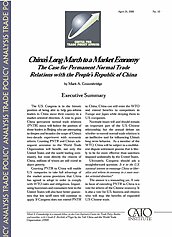The U.S. Congress is in the historic position of being able to help pro-reform leaders in China move their country in a market-oriented direction. A vote to grant China permanent normal trade relations (PNTR) status will bolster the position of those leaders in Beijing who are attempting to deepen and broaden the scope of China’s two-decade experiment with economic reform. Granting PNTR and China’s subsequent accession to the World Trade Organization will benefit, not only the United States and the world trading community, but most directly the citizens of China, millions of whom are still mired in abject poverty.
Granting PNTR to China will enable U.S. companies to take full advantage of the market access provisions that China has agreed to adopt in order to comply with WTO rules and obligations. Import-using businesses and consumers here in the United States will also have better guarantees that low tariff rates will continue to apply. If Congress does not extend PNTR to China, China can still enter the WTO and extend benefits to competitors in Europe and Japan while denying them to U.S. companies.
Nontrade issues will and should remain an important part of the U.S.-Chinese relationship, but the annual debate on whether to extend normal trade relations is an ineffective tool for influencing China’s long-term behavior. As a member of the WTO, China will be subject to a multilateral dispute settlement process that is likely to be far more effective than sanctions imposed unilaterally by the United States.
Ultimately, Congress should ask a straightforward question: Is it in the U.S. national interest to encourage China to liberalize and reform its economy in a more market-oriented direction?
The answer is a resounding yes. A vote in favor of extending PNTR to China is a vote for reform of the Chinese economy. It is also a vote for U.S. business and citizens who will reap the benefits of expanded U.S‑Chinese trade.

This work is licensed under a Creative Commons Attribution-NonCommercial-ShareAlike 4.0 International License.

